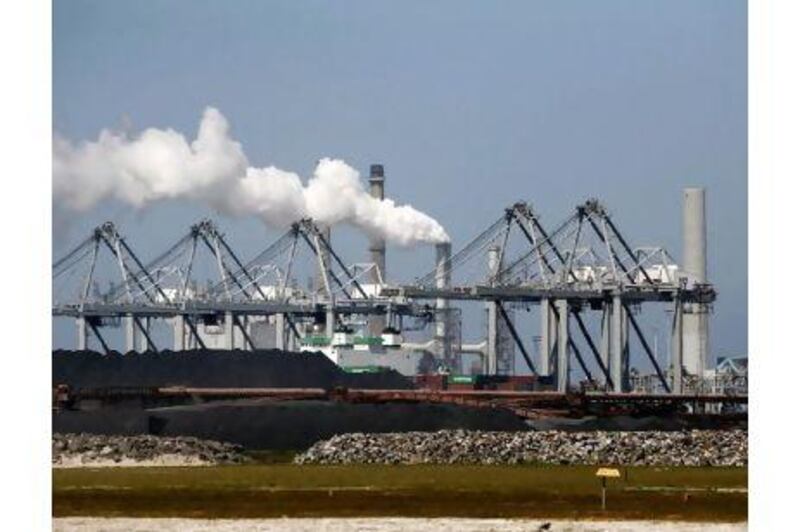Abu Dhabi National Energy Company, known as Taqa, has started work on a project to determine whether carbon dioxide from the busy Dutch port of Rotterdam can be safely stored in depleted North Sea gasfields.
The large-scale pilot demonstration is part of the Rotterdam Climate Initiative, a joint government-industry programme to halve carbon emissions from Europe's biggest international port by 2025.
"At this scale, it's the first project of its kind in the Netherlands," Bram Herkens, a project engineer at Taqa Energy, the Dutch unit of Taqa, said of the offshore carbon-storage pilot plan.
The gasfields proposed for storing waste carbon dioxide captured from power plants operated by the German and Belgian utilities E.On and Electrabel are only 20km to 40km offshore from Rotterdam. The biggest field, P-18, is the closest to shore and is expected to be first to receive injected carbon dioxide, starting in 2015.
"The world wants to know if using depleted reservoirs to store carbon dioxide is technically feasible," said Chris Gittins, the Taqa Energy commercial and business development manager. "This seems to be an obvious place to test the concept."
But before any carbon dioxide is injected into the sandstone formation about 3.5km beneath the sea-bed, there will be years of technical evaluation.
Among the many unknowns is whether it would work better to inject the carbon dioxide as a gas or compressed as a "dense phase" mixture of gas and liquid.
Another question is whether chemical reactions between carbon dioxide and the reservoir rock would cause salt particles to block channels and limit the volume of emissions that could be stored. Such questions have not been answered at other North Sea carbon-storage pilots, such as the Sleipner project operated since 1996 by Norway's Statoil.
So far, 12 tonnes of carbon dioxide have been stored in an aquifer - a porous rock formation filled with water - without measurable leakage. But the aquifer, which lies above the Sleipner gasfield, is at a relatively shallow depth of 800 metres below the sea-bed, and temperature and pressure conditions are different from those in a deep, depleted gasfield.
If all went well, Taqa Energy would initially inject about 1.1 million tonnes per year of carbon emissions into its depleted Dutch gasfields - equivalent to the annual output from a medium-sized coal-fired power plant with 250 megawatts of generating capacity. The company expects to increase the injection rate over time and eventually store 35 million tonnes of carbon dioxide in the P-18 field, Mr Gittins said.
Three basic conditions must be met for any carbon capture and storage project to be feasible: there must be a concentrated source of carbon dioxide; somewhere to store it; and a means of moving the gas from source to store.
Rotterdam is one of the few locations in the world that satisfy these conditions, with almost depleted offshore gasfields close to a major industrial centre.
The port and its surroundings are the industrial powerhouse of the Netherlands, providing a ready source of carbon dioxide, while Taqa Energy's P-18 gas production platform could easily be modified to inject gas beneath the seabed instead of pumping it out.
All that remains is to lay a short pipeline, made to the specifications required for carrying carbon dioxide instead of natural gas.
For this reason, the Dutch government identified Taqa's fields, which the company acquired from BP in 2007, as the most promising near-term prospect for storing Rotterdam's emissions. It was the government that approached Taqa about the project, which is due to receive funding from The Hague and the EU in its first stages.
Although it is early days, Taqa Energy hopes the project will be "a gateway to a network of potential [carbon dioxide] storage facilities throughout the Dutch North Sea".
Mr Gittins said the company was at the start of "a very, very long-term process". Carbon dioxide capture and storage could develop into a significant industry - but only after a long, slow build-up, he said.
tcarlisle@thenational.ae
Taqa weighs carbon dioxide storage
Abu Dhabi National Energy Company, knows as Taqa, has started to determine whether carbon dioxide from the port of Rotterdam can be safely stored in depleted North Sea gasfields.

Editor's picks
More from the national




